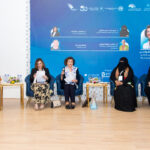AIWF Founder & Chairman Haifa Al Kaylani was honoured to join the International Labour Organization and its partners in Jordan on 11 April 2019 for a milestone celebration of the UN agency’s 100th Anniversary. This very special event, held under the esteemed Patronage of Jordan’s Prime Minister Omar Razzaz, brought together high-level delegates, including government agencies, trade unions, and employers’ organizations, as well as civil society representatives and international partners. It featured a series of impactful Keynotes and presentations, as well as folk dancing performances and the unveiling of a social justice-themed mosaic crafted by people with disabilities from the Syrian refugee and Jordanian host communities, who were trained with ILO support by the Jordan Compact, which supports economic growth, job creation and quality service delivery in Jordan.
The event was streamed live alongside similar presentations from other ILO offices around the world and highlighted some of Jordan’s recent successes at promoting decent work and social justice for workers, while also addressing some of the challenges that lie ahead in the context of the Future of Work. Haifa Al Kaylani, Founder & Chairman of the Arab International Women’s Forum and the only Commissioner from the Arab world to serve on the ILO Global Commission on the Future of Work, delivered a keynote presentation titled For a Just and Equitable Future of Work in Jordan, sharing her reflections on the future of work report outcomes and significance before turning to challenges and opportunities for Jordan in particular.
Mrs Al Kaylani noted that the ILO Future of Work Report proposes a human-centred agenda which places women and men and the work they perform at the centre of economic and social policy and business practice. This approach re-orientates the economy towards human-centered growth, economic and social policy and business practice. She elaborated on the Report’s three pillars of action: investing in people’s capabilities; investing in the institutions of work; and investing in decent and sustainable work. She focused on the importance of continuous opportunities for education, retraining, upskilling and lifelong learning which are essential to preparing citizens for inevitable change in the employment environment and to suitably prepare young people for the working world of the future. Mrs Al Kaylani also noted that young people especially will need help navigating the increasingly difficult school-to-work transition, which is already a well-documented economic empowerment challenge for Jordan, and that future of work challenges seen globally are already interacting with a number of socio-economic and demographic factors distinct to Jordan.
Mrs Al Kaylani said: “Human capital has always been deeply valued in Jordan and is widely considered to be the Kingdom’s greatest asset. Jordan has always invested in and continues to invest in education and has a highly talented population of well-education people – men, women and youth. However, the key challenge at this time is that the Jordanian economy is not yet creating enough jobs to accommodate the large numbers of school leavers and university graduates in Jordan. For an optimistic vision of the future of jobs in Jordan to become a reality, investing in people’s capabilities must involve closing the Jordan’s skills gap today, to put an end to ‘brain drain’, and build the skills needed to successfully leverage the technological advances of tomorrow.”
Mrs Al Kaylani concluded with her resounding belief that for Jordan as well as the rest of the world, “the responsibility to create an effective and appropriately financed lifelong learning ecosystem does not rest solely with governments, but equally with the private sector, workers, employers and education institutions to build and maintain opportunities for lifelong learning.”
Jordan has a long history of collaboration with the ILO. It has strived, through the common commitments of the Government, workers’ and employers’ organisations, to promote decent work, social justice and equity. The ILO and Jordan recently pledged to further promote decent work through the implementation of the country’s third Decent Work Country Programme (DWCP). The Programme supports national initiatives to promote decent work and strengthen national capacity to mainstream decent work in social and economic policies.
It was indeed a great honour for Mrs Al Kaylani to be in Amman on the very special occasion of the ILO Centenary Celebrations in Jordan, and a great privilege for her to serve on the ILO Global Commission on the Future of Work under the leadership and chairmanship of Stefan Löfven, Prime Minister of Sweden, and Cyril Ramaphosa, President of the Republic of South Africa and to have contributed to the ILO Future of Work Initiative and its landmark Report.
AIWF is proud to share that the ILO Centenary Declaration for the Future of Work 2019 was adopted at the 108th International Labour Conference on 01 July 2019, which marked the 100th anniversary of the ILO. The Declaration is a crucial statement on the major challenges and opportunities for the future of work, ranging from technology to climate change, from demographic shifts to the need for new skills. It provides guidance for dealing with these pressing issues and a platform for cooperation with other organizations in the international system. The Declaration is the culmination of years of work within the framework of the ILO’s Future of Work initiative. As a first step, member States held tripartite dialogues, which provided a rich discussion of priorities, challenges and opportunities at national and international levels. The outcomes of these dialogues informed the work of the Global Commission on the Future of Work, whose recommendations, in turn, helped craft the Centenary Declaration for the Future of Work.














